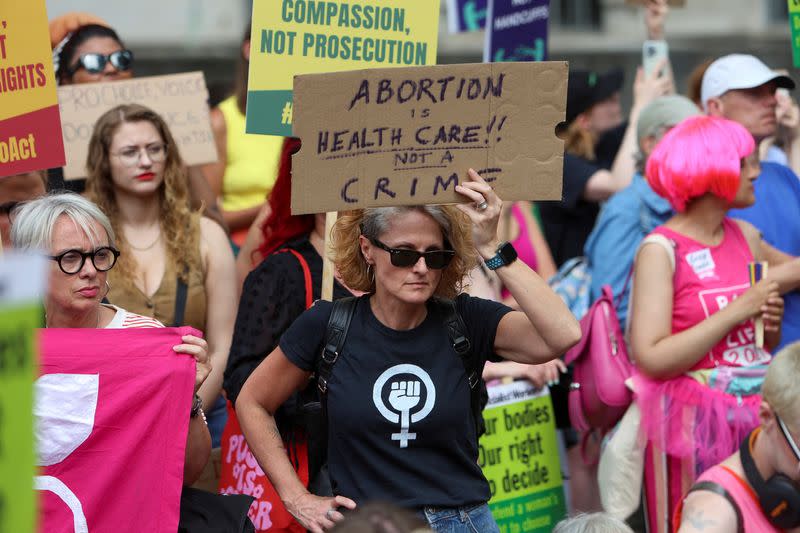Factbox-Abortion laws in Europe
BERLIN (Reuters) - Here is an overview of abortion laws across Europe, where the general trend has been towards liberalisation but some countries are imposing restrictions on women seeking to terminate a pregnancy, and deep divisions over abortion rights remain:
FRANCE - Became the world's first country to make women's free choice to request an abortion a constitutional right in March 2024.
Abortion rights, which have been legal since a landmark 1974 law, are more widely accepted in France than in the United States and many other countries, with polls showing around 80% of French people support pro-choice policies.
POLAND - Introduced a de-facto abortion ban in early 2021, with terminations only permitted in cases of rape, incest or if there is a threat to the mother's health or life. The ban prompted mass protests.
This month, parliament sent four bills liberalising abortion laws to a bipartisan committee for consideration, a sign of cooperation between Donald Tusk's ruling pro-European coalition parties despite deep splits over the issue.
The bills range from reinstating the right to abortion in cases of foetal abnormalities to allowing terminations without restrictions until 12 weeks.
It is not clear how long the work may take, but some lawmakers have suggested it could contine until a new president is elected next year. It is widely expected that current President Andrzej Duda would veto any changes to abortion legislation.
UNITED KINGDOM - Abortion is permitted up to 24 weeks of pregnancy. There is no limit in cases where a woman's life is at risk or there is a serious foetal abnormality.
A new scheme introduced during the COVID-19 pandemic allows women to end pregnancies at home within 10 weeks of conception. Beyond that point, abortions must be carried out in clinics.
MALTA - The staunchly Catholic island nation changed its strict anti-abortion laws last year to allow termination, but only when a woman's life is in danger.
Malta was previously the only European Union country not allowing any type of abortion. It remains illegal under all other circumstances including rape, incest and severe foetal abnormalities.
The law was amended after the highly publicised case of a U.S. tourist who was refused an abortion in Malta despite doctors saying her life was at risk, forcing the woman to go to Spain for the emergency procedure.
ITALY - The traditionally Catholic country has allowed terminations within 90 days of conception since 1978, but accessing an abortion can be difficult.
About 63% of gynaecologists refuse to perform the procedure on moral or religious grounds, according to 2021 data from the Health Ministry.
Several regions have restricted the use of the abortion pill and funded anti-abortion groups. Right-wing Prime Minister Giorgia Meloni is anti-abortion, but has pledged not to change the law.
SPAIN - Parliament approved legislation last year allowing girls aged 16 and 17 to have abortions without parental consent.
The law also removed a mandatory three-day "reflection" period for women seeking terminations.
Spain's 2010 abortion reform allowed women to end unwanted pregnancies on demand within 14 weeks, or up to 22 weeks in cases of severe foetal abnormalities.
However, many women face problems accessing abortions due to doctors refusing to perform the procedure. As a result, the majority of procedures are performed at private clinics.
GERMANY - Women can only have a legal abortion within 12 weeks of conception if they submit to counselling and other formal restrictions.
Abortion remains in the criminal code in Germany and can technically lead to jail sentences of up to three years although in practice, prosecutions are rare.
An expert commission on Monday recommended fully decriminalising abortion within the first 12 weeks of pregnancy.
It is up to the government whether to legislate on the commission's recommendations, but changing the law could be difficult as the right to life is enshrined in the constitution and there is likely to be pushback from the opposition.
HUNGARY - Abortion in the first 12 weeks has been legal since 1953, but Hungary tightened its rules in 2022.
The restriction was widely understood to mean that women seeking abortions would have to first listen to the foetal heartbeat.
Hungary is also among a dozen European countries that require women to undergo mandatory counselling before ending a pregnancy, a measure criticised by the World Health Organization.
Hungary adopted a new constitution in 2011 guaranteeing that the life of a foetus would be protected from the point of conception, but did not outlaw abortion.
IRELAND - The Catholic country lifted an almost total ban on abortion in 2019 following a landslide referendum in 2018.
Until then, about 3,000 women a year travelled to Britain for terminations.
The issue was thrust into the spotlight in 2012 when a woman who was miscarrying died from sepsis after doctors refused to end her pregnancy.
Abortion is now allowed up to 12 weeks of pregnancy, and later where the foetus has a terminal condition, or the woman's health is at risk.
(Reporting by Reuters bureaus, editing by Friederike Heine and Philippa Fletcher)




